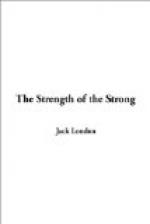But as we rode along we saw that the devastation was not confined to the main roads. The van of the flight had kept to the roads, sacking the small towns as it went; while those that followed had scattered out and swept the whole countryside like a great broom. My place was built of concrete, masonry, and tiles, and so had escaped being burned, but it was gutted clean. We found the gardener’s body in the windmill, littered around with empty shot-gun shells. He had put up a good fight. But no trace could we find of the two Italian labourers, nor of the house-keeper and her husband. Not a live thing remained. The calves, the colts, all the fancy poultry and thoroughbred stock, everything, was gone. The kitchen and the fireplaces, where the mob had cooked, were a mess, while many camp-fires outside bore witness to the large number that had fed and spent the night. What they had not eaten they had carried away. There was not a bite for us.
We spent the rest of the night vainly waiting for Dakon, and in the morning, with our revolvers, fought off half-a-dozen marauders. Then we killed one of Dakon’s horses, hiding for the future what meat we did not immediately eat. In the afternoon Collins went out for a walk, but failed to return. This was the last straw to Hanover. He was for flight there and then, and I had great difficulty in persuading him to wait for daylight. As for myself, I was convinced that the end of the general strike was near, and I was resolved to return to San Francisco. So, in the morning, we parted company, Hanover heading south, fifty pounds of horse-meat strapped to his saddle, while I, similarly loaded, headed north. Little Hanover pulled through all right, and to the end of his life he will persist, I know, in boring everybody with the narrative of his subsequent adventures.
I got as far as Belmont, on the main road back, when I was robbed of my horse-meat by three militiamen. There was no change in the situation, they said, except that it was going from bad to worse. The I.L.W. had plenty of provisions hidden away and could last out for months. I managed to get as far as Baden, when my horse was taken away from me by a dozen men. Two of them were San Francisco policemen, and the remainder were regular soldiers. This was ominous. The situation was certainly extreme when the regulars were beginning to desert. When I continued my way on foot, they already had the fire started, and the last of Dakon’s horses lay slaughtered on the ground.
As luck would have it, I sprained my ankle, and succeeded in getting no farther than South San Francisco. I lay there that night in an out-house, shivering with the cold and at the same time burning with fever. Two days I lay there, too sick to move, and on the third, reeling and giddy, supporting myself on an extemporized crutch, I tottered on toward San Francisco. I was weak as well, for it was the third day since food had passed my lips. It was a day of nightmare and torment. As in a dream I passed hundreds of regular soldiers drifting along in the opposite direction, and many policemen, with their families, organized in large groups for mutual protection.




